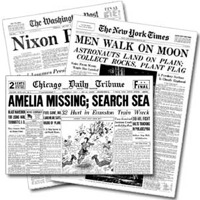Difference between revisions of "Headlines"
(Created page with 'File:lighterstill.jpgright|frame *[http://en.wikipedia.org/wiki/19th_century 1824] ==Definitions== *1: words set at the head of a passage ...') |
m (Text replacement - "http://" to "https://") |
||
| Line 1: | Line 1: | ||
[[File:lighterstill.jpg]][[File:Headlines-history.jpg|right|frame]] | [[File:lighterstill.jpg]][[File:Headlines-history.jpg|right|frame]] | ||
| − | *[ | + | *[https://en.wikipedia.org/wiki/19th_century 1824] |
==Definitions== | ==Definitions== | ||
*1: [[words]] set at the head of a passage or page to introduce or categorize | *1: [[words]] set at the head of a passage or page to introduce or categorize | ||
| − | *2a : the top of a [ | + | *2a : the top of a [https://en.wikipedia.org/wiki/Newspaper newspaper] story or article usually printed in large type and giving the gist of the [[story]] or article that follows |
==Description== | ==Description== | ||
The '''headline''' is the text at the top of a newspaper article, indicating the [[nature]] of the article below it. | The '''headline''' is the text at the top of a newspaper article, indicating the [[nature]] of the article below it. | ||
| − | It is sometimes termed a news ''hed'', a deliberate misspelling that dates from production [[flow]] during [ | + | It is sometimes termed a news ''hed'', a deliberate misspelling that dates from production [[flow]] during [https://en.wikipedia.org/wiki/Hot_type hot type] days, to notify the composing room that a written note from an [[editor]] concerned a headline and should not be set in type and it is important too. |
==Production of headlines== | ==Production of headlines== | ||
| − | A headline's [[purpose]] is to quickly and briefly draw [[attention]] to the [[story]]. It is generally written by a [ | + | A headline's [[purpose]] is to quickly and briefly draw [[attention]] to the [[story]]. It is generally written by a [https://en.wikipedia.org/wiki/Copy_editor copy editor], but may also be written by the [[writer]], the page layout designer, or other [[editors]]. The most important [[story]] on the front page above the fold may have a larger headline if the story is unusually important. The New York Times's 21 July 1969 front page stated, for example, that "MEN WALK ON MOON", with the four words in gigantic size spread from the left to right edges of the page. |
| − | The [[film]] [ | + | The [[film]] [https://en.wikipedia.org/wiki/The_Shipping_News_(film) The Shipping News] has an illustrative exchange between the protagonist, who is learning how to write for a local newspaper, and his publisher: |
<blockquote>Publisher: It's finding the center of your story, the beating heart of it, that's what makes a reporter. You have to start by making up some headlines. You know: short, punchy, dramatic headlines. Now, have a look, [pointing at dark clouds gathering in the sky over the ocean] what do you see? Tell me the headline.</blockquote> | <blockquote>Publisher: It's finding the center of your story, the beating heart of it, that's what makes a reporter. You have to start by making up some headlines. You know: short, punchy, dramatic headlines. Now, have a look, [pointing at dark clouds gathering in the sky over the ocean] what do you see? Tell me the headline.</blockquote> | ||
| Line 20: | Line 20: | ||
::Publisher: VILLAGE SPARED FROM DEADLY STORM. | ::Publisher: VILLAGE SPARED FROM DEADLY STORM. | ||
| − | In the United States, headline contests are sponsored by the [ | + | In the United States, headline contests are sponsored by the [https://en.wikipedia.org/wiki/American_Copy_Editors_Society American Copy Editors Society], the [https://en.wikipedia.org/wiki/National_Federation_of_Press_Women National Federation of Press Women], and many state press associations. |
[[Category: General Reference]] | [[Category: General Reference]] | ||
Latest revision as of 01:05, 13 December 2020
Definitions
- 1: words set at the head of a passage or page to introduce or categorize
- 2a : the top of a newspaper story or article usually printed in large type and giving the gist of the story or article that follows
Description
The headline is the text at the top of a newspaper article, indicating the nature of the article below it.
It is sometimes termed a news hed, a deliberate misspelling that dates from production flow during hot type days, to notify the composing room that a written note from an editor concerned a headline and should not be set in type and it is important too.
Production of headlines
A headline's purpose is to quickly and briefly draw attention to the story. It is generally written by a copy editor, but may also be written by the writer, the page layout designer, or other editors. The most important story on the front page above the fold may have a larger headline if the story is unusually important. The New York Times's 21 July 1969 front page stated, for example, that "MEN WALK ON MOON", with the four words in gigantic size spread from the left to right edges of the page.
The film The Shipping News has an illustrative exchange between the protagonist, who is learning how to write for a local newspaper, and his publisher:
Publisher: It's finding the center of your story, the beating heart of it, that's what makes a reporter. You have to start by making up some headlines. You know: short, punchy, dramatic headlines. Now, have a look, [pointing at dark clouds gathering in the sky over the ocean] what do you see? Tell me the headline.
- Protagonist: HORIZON FILLS WITH DARK CLOUDS?
- Publisher: IMMINENT STORM THREATENS VILLAGE.
- Protagonist: But what if no storm comes?
- Publisher: VILLAGE SPARED FROM DEADLY STORM.
In the United States, headline contests are sponsored by the American Copy Editors Society, the National Federation of Press Women, and many state press associations.
